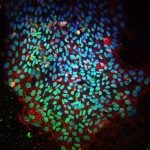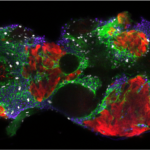Présentation
The maintenance of genome integrity plays a key role in the regeneration potential of stem cells, which are responsible for the homeostasis and regeneration of the tissue throughout life. DNA double strand breaks (DSBs) are extremely dangerous DNA lesions, which are generated by endogenous processes such as respiration and DNA replication, and exogenous treatments such as irradiation. DNA damage repair maintains genome integrity, and its impairment may affect cell or organism survival, or promote deleterious and cancer-initiating mutations. In adult stem cells impaired DSB repair may deplete the stem cell pool, induce anticipated differentiation, affect the entire progeny, and thereby impair tissue regeneration.
In the lab, it has been shown that muscle stem cells (satellite cells) repair radiation-induced DSBs more efficiently and accurately than their committed progeny but the underlying mechanism is still unclear. DSB repair efficiency thus appears to decrease as a function of cell differentiation. We are currently investigating the mechanism by which satellite cells repair DSBs. We also study the contribution of specific DSB repair factors in maintaining the proliferation and differentiation potential of muscle stem cells.




